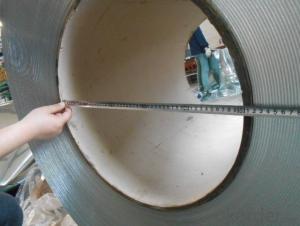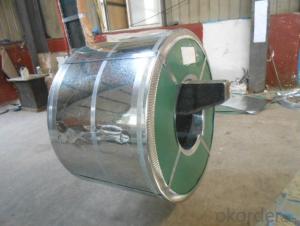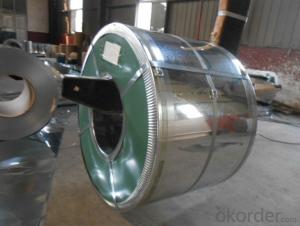BEST GALVANIZED STEEL COIL
- Loading Port:
- China Main Port
- Payment Terms:
- TT OR LC
- Min Order Qty:
- -
- Supply Capability:
- 10000 m.t./month
OKorder Service Pledge
Quality Product, Order Online Tracking, Timely Delivery
OKorder Financial Service
Credit Rating, Credit Services, Credit Purchasing
You Might Also Like
HOT-DIP GALVANIZED STEEL COIL
SIZE:0.25mm*762mm*C
ZINC COATING:60g/m2
STANDARD:JIS G 3302
SURFACE:CHROMATED,REGULAR SPANGLE, UNOILED
STEEL GRADE:SGCC
COIL WEIGHT:3-6 ton
COIL ID:508mm
- Q:I have an old classical guitar, which uses nylon strings. ive never really liked the sound produced by the nylon, so im curious if you can use a classical guitar with acoustic guitar steel strings. thanks!
- NO ! NO! NO! Do not put steel strings on a classical guitar!! The increased tension can actually damage the guitar by causing the top to warp and can eventually pull the bridge right off of the guitar! I have seen it happen more than once! Ignore the other post, they are wrong! Classical guitars are designed to use nylon strings only!
- Q:What are the different types of steel alloys used in coil production?
- There are various types of steel alloys used in coil production, including carbon steel, stainless steel, alloy steel, and tool steel.
- Q:How are steel coils used in the manufacturing of elevator components?
- Steel coils are used in the manufacturing of elevator components as they provide a high strength material that can be shaped and formed into various parts such as brackets, frames, and supports. These coils are typically processed and cut into the required sizes and shapes before being further fabricated and assembled into elevator components, ensuring the necessary structural integrity and durability for safe elevator operation.
- Q:Can steel coils be reused?
- Yes, steel coils can be reused. Steel is a highly recyclable material, and steel coils can be melted down and used to produce new steel products. Recycling steel coils not only helps to conserve resources and reduce waste but also contributes to a more sustainable and environmentally-friendly manufacturing process.
- Q:How are steel coils used in the production of storage tanks and silos?
- Steel coils are an essential component in the production of storage tanks and silos due to their strength and durability. These coils are typically made from high-quality steel and are processed through various manufacturing techniques to attain the desired thickness and shape. In the production process, steel coils are first uncoiled and then cut into specific sizes and lengths to meet the requirements of the storage tank or silo design. The coils are then shaped into cylindrical sections, using bending and rolling machines, to create the main body of the tank or silo. Once the desired shape is achieved, the coils are welded together to form a continuous and secure seam. This welding process ensures that the tanks and silos are leak-proof and can withstand the pressure exerted by the stored materials. Furthermore, steel coils also play a crucial role in reinforcing the structure of storage tanks and silos. They are often used to create the roofs, bottoms, and other structural components of these storage units. The strength and resilience of steel make it ideal for withstanding the weight of the stored materials and any external forces that may be exerted on the tank or silo. Additionally, steel coils can be coated or treated with protective materials to enhance their resistance to corrosion and extend their lifespan. This is particularly important for storage tanks and silos that are used to store corrosive substances or are exposed to harsh environmental conditions. Overall, steel coils are a fundamental element in the production of storage tanks and silos, providing the necessary strength, durability, and structural integrity required for these storage units.
- Q:How do steel coils compare to stainless steel coils?
- Steel coils and stainless steel coils are both widely used in various industries for their strength and durability. However, there are some key differences between the two that should be considered when choosing the appropriate material for a specific application. One of the main distinctions between steel coils and stainless steel coils is the composition of the materials. Steel coils are made primarily of iron and carbon, with other elements added to enhance specific properties. On the other hand, stainless steel coils are made of iron, carbon, and a significant amount of chromium, which gives them their unique corrosion-resistant properties. Due to the presence of chromium, stainless steel coils offer superior resistance to corrosion, tarnishing, and rust compared to regular steel coils. This makes stainless steel coils particularly suitable for applications in environments with high humidity, moisture, or exposure to corrosive substances. In contrast, steel coils are more prone to rust and may require additional protective coatings or treatments to prevent corrosion. Another significant difference is the appearance of the two materials. Stainless steel coils have a shiny and reflective surface, giving them an aesthetically pleasing look. They are commonly used in applications where appearance is important, such as kitchen appliances, architectural structures, or decorative purposes. Steel coils, on the other hand, have a matte or dull finish and are often used in industrial applications where appearance is not a primary concern. In terms of strength, both steel and stainless steel coils offer excellent mechanical properties. However, stainless steel coils generally exhibit higher tensile strength and greater resistance to high temperatures. This makes them suitable for applications that require strength, such as construction, automotive, or aerospace industries. Lastly, cost is a factor that should be considered when comparing steel coils to stainless steel coils. Steel coils are generally more cost-effective than stainless steel coils due to the lower cost of raw materials and simpler manufacturing processes. However, when the added value of corrosion resistance and longevity is taken into account, stainless steel coils may prove to be a more economical choice in the long run, as they require less maintenance and replacement. In conclusion, steel coils and stainless steel coils have different properties and characteristics that make them suitable for specific applications. Stainless steel coils offer superior corrosion resistance, a shiny appearance, and higher tensile strength, while steel coils are more cost-effective. The choice between the two ultimately depends on the specific requirements of the application, such as the environment, aesthetics, strength, and budget.
- Q:ok I got a dpms ar 15 and all i have put though it is good brass 223 ammo but is it ok to shoot the old crappy steel cased wolf ammo out of it will it hurt its function or will it hurt it cosmetically?
- The primary complaint about wolf steel cased stuff besides it being dirty is that is wears out the chamber and extractor faster than brass. That is not true. It would be true if the cases were actually steel instead of a mixture that has a hardness that is close to brass. Now to prove how pervasive this myth is I expect a minimum of 4 thumbs down for this statement alone. In any case the only issue is that is you do use steel cased ammo the chamber has to be better cleaned. The residue left behind from the coating on the steel casings will build up. If you keep firing the cheap steel cased stuff this tend to be less of an issue but when you use brass cased ammo without cleaning the chamber out or in the same session once it heats up the stuff will actually grip the brass tightly causing case head tears. And your only option is to wait for the gun to cool down yank it out by hand because at that point the casing is in essence glued into the chamber.
- Q:So...that means Wolverine can stab him, right? Because Adamantite is stronger than steel. Correct?
- Not really, it's just a nickname. Wolverine couldn't stab Superman.
- Q:What are the different coil packaging methods used for steel coils?
- Steel coils can be packaged using various methods to guarantee their protection and secure transportation. These methods also help optimize storage space. Some of the commonly used packaging methods for steel coils are as follows: 1. Strapping: Metal or plastic straps are used to secure the steel coils. This ensures stability and prevents unrolling or shifting during transportation. Strapping is suitable for smaller coils or when other packaging methods are also utilized. 2. Stretch wrapping: Steel coils are tightly wrapped using a stretch film. This technique provides excellent protection against dust, moisture, and other contaminants. It also keeps the coils tightly bound and prevents movement during handling and transportation. 3. Steel banding: Steel bands or straps are employed to secure the coils. This packaging method offers superior strength and durability. It is ideal for larger and heavier steel coils that require additional reinforcement. 4. Wooden crating: Particularly large or heavy steel coils are packaged in wooden crates. These crates provide enhanced protection against impacts, moisture, and other external factors. Wooden crating is commonly used for long-distance transportation or when coils need to be stored for extended periods. 5. Coil saddles: Specialized devices called coil saddles are used to package large coils securely. These devices prevent rolling or movement. Coil saddles are preferred when strapping or wrapping is not feasible. 6. Paper interleaving: Sheets of paper are placed between each layer of steel coils to prevent damage caused by friction. This method is commonly used for coils with a high surface finish or those susceptible to scratching. Each of these packaging methods offers distinct advantages and is chosen based on factors such as coil size, weight, transportation requirements, and desired level of protection. By employing these methods, steel coil manufacturers and distributors can ensure the safe arrival of their products in optimal condition.
- Q:What are the applications of steel coils in automotive manufacturing?
- Steel coils have various applications in automotive manufacturing. They are used primarily for the production of car bodies, as well as for other components such as doors, hoods, fenders, and trunk lids. Steel coils provide high strength, durability, and formability, making them suitable for creating robust and safe vehicles. Additionally, they offer excellent resistance to corrosion and can be easily molded into complex shapes, ensuring the desired design aesthetics and functionality.
1. Manufacturer Overview |
|
|---|---|
| Location | |
| Year Established | |
| Annual Output Value | |
| Main Markets | |
| Company Certifications | |
2. Manufacturer Certificates |
|
|---|---|
| a) Certification Name | |
| Range | |
| Reference | |
| Validity Period | |
3. Manufacturer Capability |
|
|---|---|
| a)Trade Capacity | |
| Nearest Port | |
| Export Percentage | |
| No.of Employees in Trade Department | |
| Language Spoken: | |
| b)Factory Information | |
| Factory Size: | |
| No. of Production Lines | |
| Contract Manufacturing | |
| Product Price Range | |
Send your message to us
BEST GALVANIZED STEEL COIL
- Loading Port:
- China Main Port
- Payment Terms:
- TT OR LC
- Min Order Qty:
- -
- Supply Capability:
- 10000 m.t./month
OKorder Service Pledge
Quality Product, Order Online Tracking, Timely Delivery
OKorder Financial Service
Credit Rating, Credit Services, Credit Purchasing
Similar products
New products
Hot products
Related keywords





























